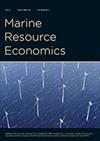Fishery Collapse Revisited
IF 1.7
3区 经济学
Q2 ECONOMICS
引用次数: 3
Abstract
Fishery collapse has been defined as a fishery with annual landings less than 10% of the historic maximum observed catch. However, this 10% rule is not grounded in bioeconomic theory despite being widely used in empirical economic studies of fisheries. We assess the 10% rule by simulating fisheries under pure open access, open access with cost changes, open access with critical depensation, optimal management (both deterministic and stochastic cases), and rebuilding plans. We show that the 10% rule generates false negatives and false positives, and that the prevalence of these problems varies under different institutional configurations, economic incentives, and biological conditions. We urge researchers to abandon this outcome measure for comparative empirical tests and encourage more research on collapse that attends to human agency and institutions.渔业崩溃再访
渔业崩溃被定义为年渔获量低于历史最大观测渔获量的10%的渔业。然而,尽管这一10%的规则被广泛用于渔业的实证经济研究,但它并没有建立在生物经济理论的基础上。我们通过模拟纯开放获取、成本变化的开放获取、关键补偿的开放获取和最优管理(确定性和随机性情况)以及重建计划下的渔业来评估10%规则。我们发现,10%规则会产生假阴性和假阳性,并且这些问题的普遍性在不同的制度配置、经济激励和生物条件下有所不同。我们敦促研究人员放弃这一结果衡量标准,进行比较实证测试,并鼓励对人类机构和制度的崩溃进行更多研究。
本文章由计算机程序翻译,如有差异,请以英文原文为准。
求助全文
约1分钟内获得全文
求助全文
来源期刊

Marine Resource Economics
农林科学-渔业
CiteScore
4.30
自引率
10.30%
发文量
25
审稿时长
>12 weeks
期刊介绍:
Marine Resource Economics (MRE) publishes creative and scholarly economic analyses of a range of issues related to natural resource use in the global marine environment. The scope of the journal includes conceptual and empirical investigations aimed at addressing real-world oceans and coastal policy problems. Examples include studies of fisheries, aquaculture, seafood marketing and trade, marine biodiversity, marine and coastal recreation, marine pollution, offshore oil and gas, seabed mining, renewable ocean energy sources, marine transportation, coastal land use and climate adaptation, and management of estuaries and watersheds.
 求助内容:
求助内容: 应助结果提醒方式:
应助结果提醒方式:


